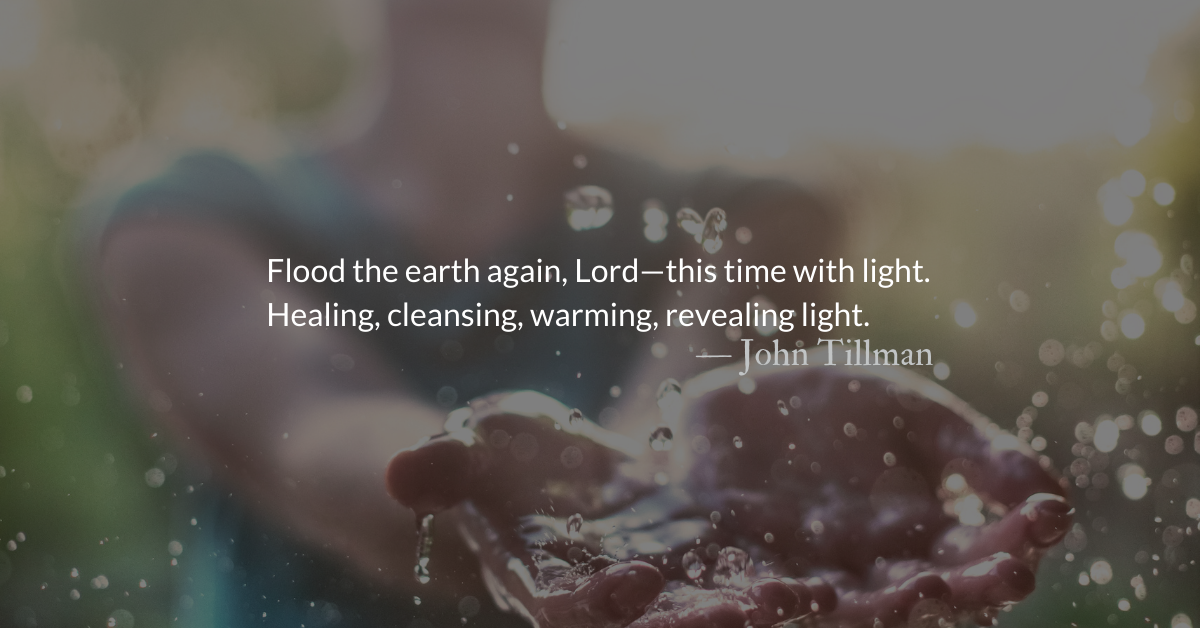Scripture Focus: Genesis 6.11-13
11 Now the earth was corrupt in God’s sight and was full of violence. 12 God saw how corrupt the earth had become, for all the people on earth had corrupted their ways. 13 So God said to Noah, “I am going to put an end to all people, for the earth is filled with violence because of them. I am surely going to destroy both them and the earth.
Matthew 6.22-23
22 “The eye is the lamp of the body. If your eyes are healthy, your whole body will be full of light. 23 But if your eyes are unhealthy, your whole body will be full of darkness. If then the light within you is darkness, how great is that darkness!
Reflection: The Floodlight of Epiphany
By John Tillman
Today is Epiphany. Epiphany follows the twelfth day of Christmas and is the end of the Christmastide season.
Epiphany means manifestation and is a day of revealing. It is a day of light. It is a day in which the prophecy of Isaiah 9.1-2 begins to see its fulfillment. All peoples of the Earth, represented by the Magi who visited Jesus, are blessed by the appearance of the Christ. Epiphany is celebrated on a day but is also a process. Matthew refers back to this prophecy (Matthew 4.12-17) to describe the beginning of Jesus’ ministry.
On the people living in the land of deep darkness…a light has dawned.
Today is an Epiphany—one of many celebrated over the centuries. The light of Epiphany continues to reveal the evil of humanity and the goodness of God’s mercy and justice toward them.
Jesus addressed inner darkness directly when he taught the parable of the eye and the lamp of the body. Noah experienced how dark the world can be when people give themselves over to violence. Light becomes darkness. Good becomes evil.
Today, we will pray that the light of Christ would dawn, exposing darkness.
Let Light Dawn
Oh, Christ, let your light dawn on us!
Heal our darkened eyes that light may enter our bodies.
Light our lamps with the oil of your Spirit, warming our hearts and driving out our darkness.
Reveal yourself to the nations through us as a dawning light.
Lord, at dawn the day is only beginning.
At dawn, the light glows softly. May it grow brighter.
At dawn, we have a choice to make:
To work and walk in the light or hide in the shadows of selfishness.
Let us leave the shadows.
Let us work the fields while there is light.
Let us walk in the light and call to those in darkness to join us.
May evil be exposed.
May hatred be bleached from our souls by the burning light of the sun.
May lies and liars be exposed.
May truth shine, expelling every dark, deceitful shadow.
May the darkness of violence have no shelter in our hearts.
May peace and mercy be made known by our words and actions.
May our love be a warming light that draws people to you.
Flood the earth again, Lord—this time with light.
Healing, cleansing, warming, revealing light.
Divine Hours Prayer: The Refrain for the Morning Lessons
Let all flesh bless his holy Name forever and ever. — Psalm 145.22
– Divine Hours prayers from The Divine Hours: Prayers for Autumn and Wintertime by Phyllis Tickle
Today’s Readings
Genesis 6 (Listen – 2:48)
Matthew 6 (Listen – 4:35)
Read more about Into His Light — Hope of Advent
The corruption of this world deepens the darkness we live in each day and, in sinfulness, we prefer darkness to light.
Read more about Becoming Light — Hope of Advent
May the fruit of the light shine from us.
May goodness, righteousness, and truth beam from us.









